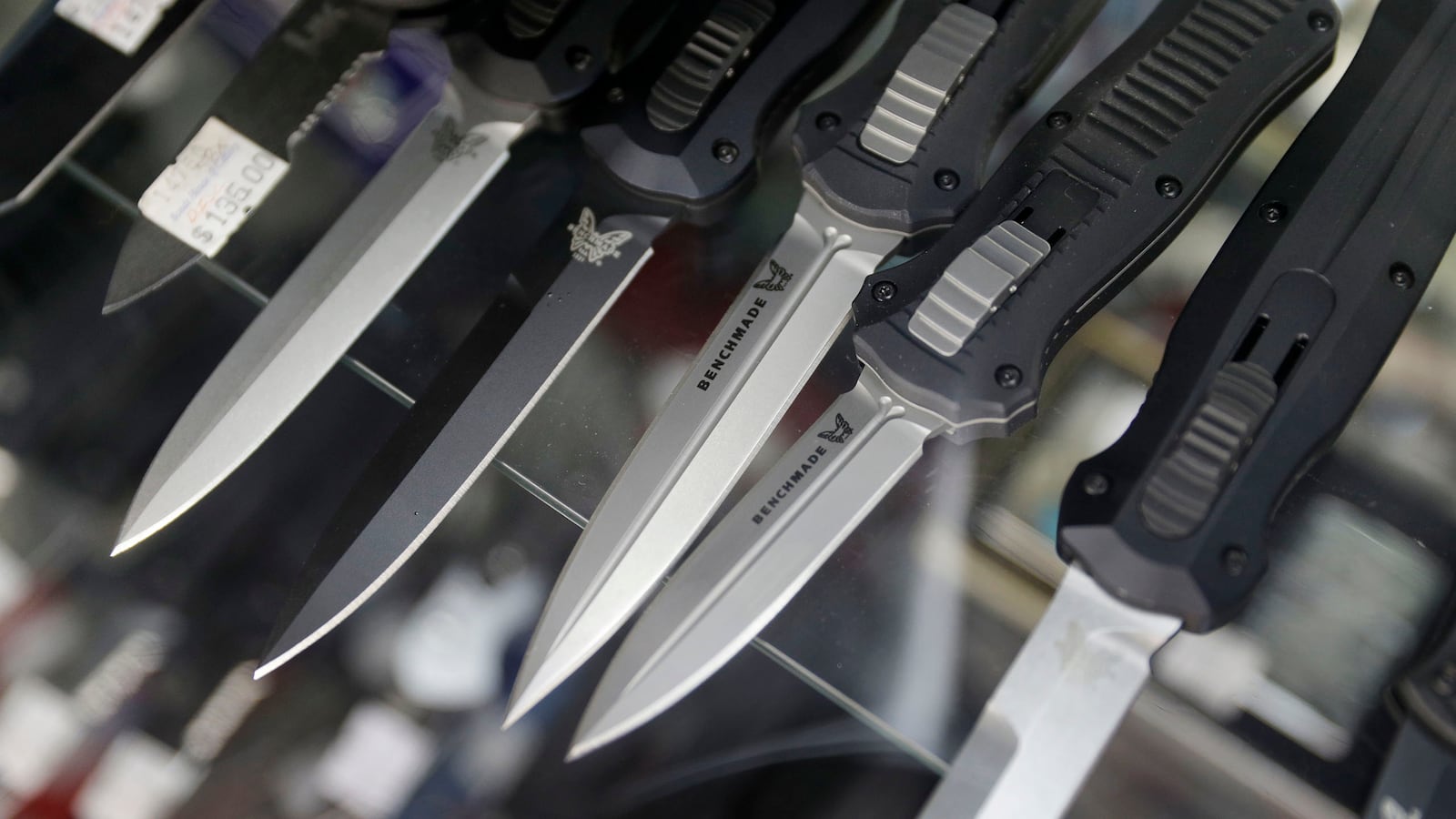New York Gov. Andrew Cuomo late Monday night killed a bill to reform the state’s controversial “gravity knife” law, which has been used to jail thousands of working people of color.
Cuomo used his veto message to cite “continued concerns of law enforcement” in quashing a measure that had the support of virtually every criminal-justice reform organization in the state. It’s a move that’s bound to draw criticism for a Democrat who often cites equitable justice policies as among his biggest priorities and may have presidential ambitions.
The bill’s failure represents something of a victory for another New York politician, Manhattan District Attorney Cyrus Vance, who has not seen many of those lately. Vance has been pilloried for passing up giftwrapped prosecutions of Harvey Weinstein and the Trump children. Vance has lobbied aggressively for years against reforms that have been percolating since 2014.
The “gravity knife” law was first passed in 1958, and targeted at a large, menacing variety of knife similar to a switchblade. While true gravity knives are nearly extinct on the modern market, in recent years the law has been interpreted by New York City authorities to ban a wide range of common folding knives. Any knife that can be opened with a practiced flick of the wrist, which includes virtually every widely available pocketknife, can be shoehorned into the legal definition, even if it was never designed to operate that way. In most cases, the charge is a misdemeanor, but defendants with a prior conviction can draw a felony charge and up to seven years in prison.
Take the case of Richard Gonzalez, a laborer Vance prosecuted in 2011 for the Husky utility knife he bought at Home Depot. The tool he had in his possession is exceedingly common, and generally used to cut drywall. Its exposed blade is about an inch long. When he was contacted by police in a subway station, Gonzalez wasn’t accused of using the knife to harm anyone, or even threatening to do so. But when an officer spotted it in his pocket, and found that it could be snapped open with a flick, he was arrested. Vance prosecuted Gonzalez’ case aggressively, and he ultimately served four years in state prison.
Vance has long argued that knives that open quickly pose a special danger. In a letter responding to a New York Times editorial last summer, Vance pointed to an uptick in knife crimes to suggest that the reforms were ill timed.
“The ban has enhanced public safety, and ending it now amid highly publicized slashing incidents in our city’s streets and subways is not advisable,” Vance wrote.
Like many misdemeanor charges, gravity knife cases in Manhattan are often dismissed with a kind of probation agreement, and Vance says he doesn’t prosecute workers who possess knives for legitimate purposes.
But there is no evidence that gravity knives, as a class, are especially prone to use in crime. And oddly enough, the law is almost never enforced outside of New York City. In contrast, as many as 70,000 people in the five boroughs have been arrested under the statute in the past 10 years, according to statistics compiled by the Legal Aid Society.
About 84 percent of defendants were people of color, and a disproportionate number of them were prosecuted in Vance’s jurisdiction. One study found that Vance’s office had prosecuted about four times as many felony gravity knife cases as the rest of the city’s DAs combined.
Public defenders complain that the law is little more than an easy way for officers to pad their arrest numbers in a quota-driven system. Maybe most maddening for lawyers who defend these cases is that such knives are still sold openly at retailers all over the city. The Legal Aid Society last year found more than 100 stores selling them in Manhattan alone. One hardware store on Gold Street in Lower Manhattan, a few blocks from Vance’s own office, has such knives in their front window.
While Vance has prosecuted scores of contractors, construction workers and other working people for their tools, he has not levied criminal charges against a single retailer for selling those same knives.
Vance had an opportunity to do so in 2010, only months after he took office, when he sent investigators to surveil retailers like Home Depot, Ace Hardware and Eastern Mountain Sports. At all of them, he found knives that routinely draw felony charges in his jurisdiction.
But rather than take those companies to court, he offered them something else entirely: a deferred prosecution agreement. After a splashy press conference, seven businesses were required to submit to monitoring by Vance’s agent over a period of two years, and to remit some sales proceeds, about $1.9 million collectively. In exchange, Vance promised not to file criminal charges. It was considerably more lenient treatment than Vance offered Gonzalez and legions of others.
But if that disparity wasn’t stark enough, five of those retailers also went on to violate their agreements in various ways, according to an internal report released under New York’s Freedom of Information Law. Even when some continued selling knives they had agreed to cease carrying, they suffered no consequences.
As late as 11:30 last night, a compromise on the reforms seemed likely, according to multiple parties involved on both sides of the negotiations. An alteration of the bill as passed would have stopped short of full legalization, instead downgrading possession of a gravity knife to a noncriminal offense.
That would have been a far from perfect solution for reformers — it would have still allowed arrest at an officer’s discretion — but it would, crucially, have eliminated the felony provisions and the many knock-on effects of a misdemeanor charge, like sometimes dire immigration consequences. Opposition from Vance seems to have been a factor yet again, as were machinations by the Republican senate leadership.
The legislative reform effort’s main driver, Manhattan Assemblymember Dan Quart, released a caustic statement calling the failure a “dark mark on our legislative process,” and pointing to the bipartisan coalition that had brought the bill through the legislature with nearly unanimous support.
“Communities of color will have no relief from the Manhattan District Attorney's pattern of prosecuting poor people for possessing this simple work tool,” in the wake of Cuomo’s decision, Quart said. “Make no mistake, this veto will have real life consequences for New York families.”






